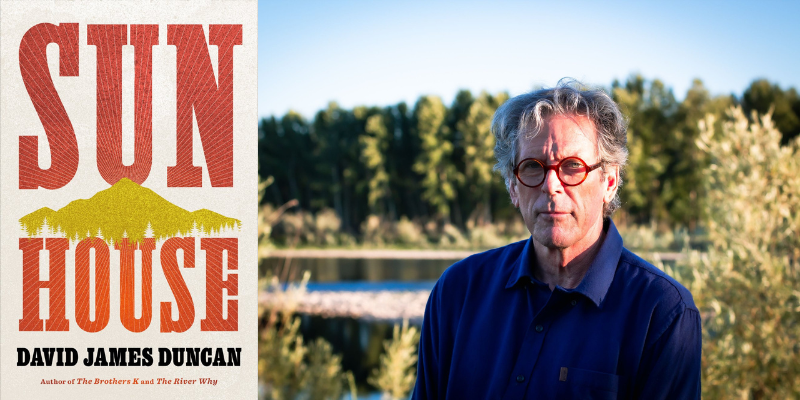
David James Duncan on Choosing Between Art and Activism
In Conversation with Mitzi Rapkin on the First Draft Podcast
First Draft: A Dialogue of Writing is a weekly show featuring in-depth interviews with fiction, nonfiction, essay writers, and poets, highlighting the voices of writers as they discuss their work, their craft, and the literary arts. Hosted by Mitzi Rapkin, First Draft celebrates creative writing and the individuals who are dedicated to bringing their carefully chosen words to print as well as the impact writers have on the world we live in.
In this episode, Mitzi talks to David James Duncan about his new book, Sun House.
Subscribe and download the episode, wherever you get your podcasts!
From the episode:
Mitzi Rapkin: You have these characters, and I’m sure that you’re in love with them in a certain way, and some of them probably annoy you just like real people, and you’re writing about them over 16 years. And I’m sure that you went through your own personal changes over the course of writing this novel. So how do you maintain a narrative voice over 16 years, while your life is changing so much? And maybe your ideas of the world? I don’t know.
David James Duncan: Yeah, in some ways they did. By the end of Sun House one thing that’s dropped away is that I was much more an activist when I was younger. And in touring Sun House, I’ve met so many people who still love The River Why and The Brothers K, both of which still sell a lot of copies. And I realized that I like the effect my novels have had on the world more than the effect my nonfiction has had. When you’re going after the people who love dams, at a time when 80% of the world’s rivers have been dammed, and most of the time by petty dictators or by corrupt bureaucracies, like the Bonneville Power Administration that has driven many of the salmon runs and steelhead runs to the Columbia, Snake River to extinction, you just have to be so testy going after those people, you know, and I’ve done a lot of that. I’ve had a lot of things like I’ve done a couple of town halls in Seattle, of salmon activism, where you can just see how the room divides politically, and there’ll be this mass exodus of people out of the lecture hall when I get a little too specific about – I’m not even going to start because I’ve pretty much renounced that. I’m doing everything I can for wild salmon still, but it’s in a way that is taking a more mythological approach in this form of a graphic novel that I’m writing that’s completely mythological. It’s all told in the verse of William Butler Yeats, “The Song of Wandering Aengus”.
I went out to the hazel wood,
Because a fire was in my head,
And cut and peeled a hazel wand,
Article continues after advertisementAnd hooked a berry to a thread;
And when white moths were on the wing,
And moth-like stars were flickering out,
I dropped the berry in a stream
And caught a little silver trout.
Article continues after advertisement
When I had laid it on the floor
I went to blow the fire a-flame,
But something rustled on the floor,
And someone called me by my name:
Article continues after advertisementIt had become a glimmering girl
With apple blossom in her hair
Who called me by my name and ran
And faded through the brightening air.
Article continues after advertisementThough I am old with wandering
Through hollow lands and hilly lands,
I will find out where she has gone,
And kiss her lips and take her hands;
And walk among long dappled grass,
Article continues after advertisementAnd pluck till time and times are done,
The silver apples of the moon,
The golden apples of the sun.
This is a mythological allegiance to the pursuit of beauty that Yates held to his entire life and only seemed to get into trouble when he got political. And so, I’m just at this point in life maybe some of the fight is gone out of me, but I’m just more attracted to the truth that is beauty.
***
David James Duncan is the author of the novels The River Why, The Brothers K, and Sun House, the story collection River Teeth, and the nonfiction collection and National Book Award finalist, My Story as Told by Water, and the best-selling collection of “churchless sermons,” God Laughs & Plays. He lives on a trout stream in Missoula, Montana.
First Draft: A Dialogue on Writing
First Draft: A Dialogue on Writing is a literary podcast produced and hosted by Mitzi Rapkin. Each episode features an in-depth interview with a fiction, non-fiction, essay, or poetry writer. The show is equal parts investigation into the craft of writing and conversation about the topics of an author’s work.



















